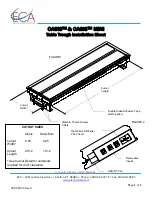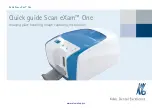
TDS Family Oscilloscope Programmer Manual
Glossary–1
Glossary
ASCII
Acronym for the American Standard Code for Information Interchange.
Controllers transmit commands to the digitizing oscilloscope using ASCII
character encoding.
Address
A 7-bit code that identifies an instrument on the communication bus. The
digitizing oscilloscope must have a unique address for the controller to
recognize and transmit commands to it.
Backus-Naur Form (BNF)
A standard notation system for command syntax diagrams. The syntax
diagrams in this manual use BNF notation.
Controller
A computer or other device that sends commands to and accepts responses
from the digitizing oscilloscope.
EOI
A mnemonic referring to the control line “End or Identify” on the GPIB
interface bus. One of the two possible end-of-message terminators.
EOM
A generic acronym referring to the end-of-message terminator. The
end-of-message terminator can be either an EOI or the ASCII code for line
feed (LF).
Equivalent-time sampling (ET)
A sampling mode in which the oscilloscope acquires signals over many
repetitions of the event. The TDS Family Series Digitizing Oscilloscopes use
a type of equivalent time sampling called random equivalent time sampling.
It utilizes an internal clock that runs asynchronously with respect to the input
signal and the signal trigger. The oscilloscope takes samples continuously,
independent of the trigger position, and displays them based on the time
difference between the sample and the trigger. Although the samples are
taken sequentially in time, they are random with respect to the trigger.
Extended–acquisition–length mode
An acquisition mode with which the oscilloscope can acquire signals of 2M,
4M, and 8M while maintaining waveform lengths limited to 500K. In other
words, the acquisition data for a channel may be bigger than a waveform,
Then, after the data is acquired, you can move to and display any portion of
the data.
















































